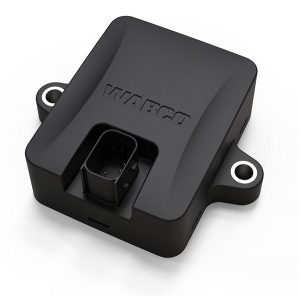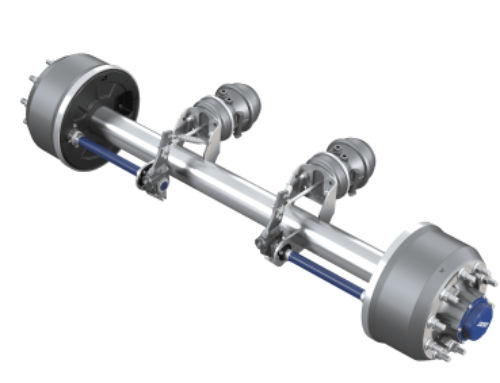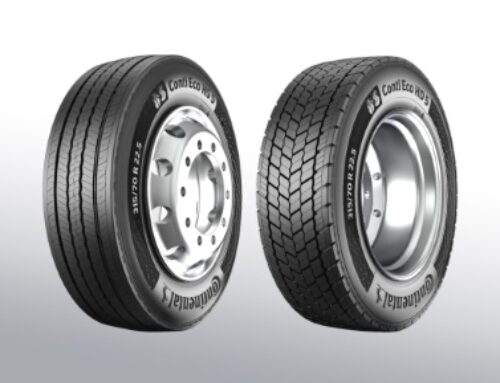TX-Trailerpulse takes diagnostics to the cloud
 Recent developments at ZF’s Commercial Vehicle Control Systems (CVCS) division, formerly Wabco, include the Transics-branded trailer monitoring and remote diagnostics solution, TX-Trailerpulse, alongside its trailer health portal TX-Trailerfit – which the company says represent a major step forward in the expansion of the digital transport ecosystem.
Recent developments at ZF’s Commercial Vehicle Control Systems (CVCS) division, formerly Wabco, include the Transics-branded trailer monitoring and remote diagnostics solution, TX-Trailerpulse, alongside its trailer health portal TX-Trailerfit – which the company says represent a major step forward in the expansion of the digital transport ecosystem.
“The TX-Trailerpulse is a trailer-focused IoT connectivity solution that combines real-time track and trace functionality with additional remote trailer health and diagnostics information,” said Peter Bal, business leader, digital customer services EMEA at ZF Commercial Vehicle Control Systems.
“The solution is the first of its kind, combining both trailer tracking and advanced remote diagnostics, at a cost that enables fleet-wide deployment across all trailer types.
“Directly connected to the Trailer Electronic Braking System (TEBS), the solution captures and processes TEBS and trailer diagnostics data via the web-based TX-Trailerfit portal. This enables assessment of the technical health of the trailer and visualises trailer diagnostics features, including ‘fault code-to-plain language’ translation, root cause indication and repair information.
“Due to the role-based nature of both portals, several users with different ‘roles’, from the fleet to the workshop, can access the data and portals separately or simultaneously.”
 TX-Trailerpulse can be easily installed with its two-point housing layout and single, cabled connectivity to the TEBS system, explains Peter, either as an original equipment fitment or as a retrofit option for fleets.
TX-Trailerpulse can be easily installed with its two-point housing layout and single, cabled connectivity to the TEBS system, explains Peter, either as an original equipment fitment or as a retrofit option for fleets.
“Once connected, TX-Trailerpulse automatically powers up, connects to the Global Navigation Satellite System (GNSS) and Global System for Mobile Communication (GSM) network through its integrated module, and starts broadcasting data via an embedded SIM card.
“The device is IP69K-rated to ensure it is resistant to dust, water and heat ingress, with an operating range of -40°C up to +85°C, making it particularly well-suited to outside installation on trailers and for daily use in adverse environments. Data processed or captured by TX-Trailerpulse can be further integrated with other third-party software systems via Web Services.”
In addition to providing the same information to the back office that a technician would receive from a physical readout in the workshop, TX-Trailerpulse makes data available remotely and in real time, adds Peter. Specifically, the solution provides a wide range of trailer information, including trailer brand, model, EBS type and axle configuration.
“TX-Trailerpulse processes the diagnostics code history, including maintenance and uptime management as recorded by the Operating Data Recorder (ODR) specifically recording events such as tilt alerts, insufficient tyre pressure, RSS events, warning lamps, supply pressure warnings, wheel-speed, demand pressure and axle load sensor data,” he explained.
“The occurrence of any new Diagnostic Trouble Code (DTC) or EBS warning lamp forces a new read-out of ODR data and results in a constantly updated trailer health score for each vehicle. A historical overview of these error codes and warning alerts in the TX-Trailerfit portal enables patterns or reoccurrences of technical issues to be readily identified and addressed.”
Taking DTCs and contextual data into consideration, a health score is generated for each individual trailer within a fleet, he explains, allowing operators to prioritise maintenance activities and to act preventively to mitigate any degradation of trailer health scores.
“Fleets can securely share these overviews with workshops, enabling accelerated repair and maintenance by improving the communication flow on trailer health throughout the service chain, generated error codes and diagnostics data,” said Peter.
“As a result, workshops are better prepared to perform analysis, determine the best course of action and take prompt maintenance and repair decisions. Data captured on trailer health also enables fleet operators to more easily comply with regional or national regulations related to road safety.”











